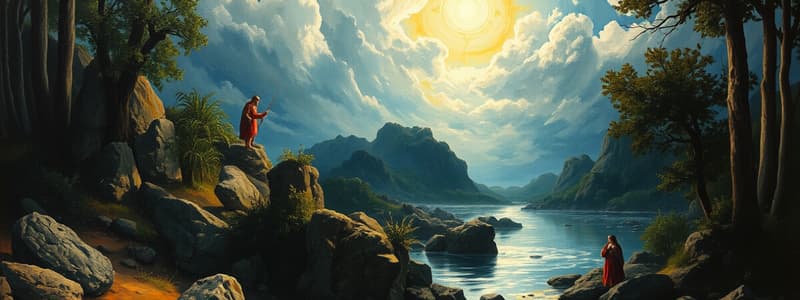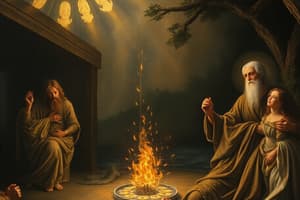Podcast
Questions and Answers
What was created on Day 3 of the Creation story?
What was created on Day 3 of the Creation story?
- Marine life and birds
- Light and darkness
- Land and vegetation (correct)
- Sun, moon, and stars
Which sign is associated with the Noahic Covenant?
Which sign is associated with the Noahic Covenant?
- Blood
- Circumcision
- Stone tablets
- Rainbow (correct)
Who is known as the father of faith in the patriarchal narratives?
Who is known as the father of faith in the patriarchal narratives?
- Isaac
- Abraham (correct)
- Jacob
- Joseph
What caused God to decide to send the Flood?
What caused God to decide to send the Flood?
What was the relationship between Jacob and Esau?
What was the relationship between Jacob and Esau?
What extraordinary position did Joseph achieve in Egypt?
What extraordinary position did Joseph achieve in Egypt?
What prominent item was given to Joseph by his father Jacob?
What prominent item was given to Joseph by his father Jacob?
What action did Abraham take that demonstrated his faith?
What action did Abraham take that demonstrated his faith?
Which of the following cities was NOT part of the Sumerian Civilization's important city-states?
Which of the following cities was NOT part of the Sumerian Civilization's important city-states?
What was the primary purpose of cuneiform writing in ancient Mesopotamia?
What was the primary purpose of cuneiform writing in ancient Mesopotamia?
Which king is associated with the rise of the Babylonian Empire around 1894 BCE?
Which king is associated with the rise of the Babylonian Empire around 1894 BCE?
What significant advancement in agriculture was NOT utilized by ancient Mesopotamians?
What significant advancement in agriculture was NOT utilized by ancient Mesopotamians?
Which structure is recognized as one of the Seven Wonders of the Ancient World?
Which structure is recognized as one of the Seven Wonders of the Ancient World?
Which aspect of Assyrian Culture is particularly noted for its strength?
Which aspect of Assyrian Culture is particularly noted for its strength?
How did cuneiform writing evolve over time?
How did cuneiform writing evolve over time?
What staple crop was NOT grown by ancient Mesopotamian farmers?
What staple crop was NOT grown by ancient Mesopotamian farmers?
Which form of government was characteristic of the Sumerian civilization?
Which form of government was characteristic of the Sumerian civilization?
What material was primarily used by the Sumerians for writing cuneiform?
What material was primarily used by the Sumerians for writing cuneiform?
Flashcards are hidden until you start studying
Study Notes
The Book of Genesis Study Notes
Creation Story
-
Days of Creation:
- Day 1: Light and darkness created (Genesis 1:1-5).
- Day 2: Sky and waters separated (Genesis 1:6-8).
- Day 3: Land and vegetation created (Genesis 1:9-13).
- Day 4: Sun, moon, and stars created (Genesis 1:14-19).
- Day 5: Marine life and birds created (Genesis 1:20-23).
- Day 6: Land animals and humanity created (Genesis 1:24-31).
- Day 7: God rests and sanctifies the day (Genesis 2:1-3).
-
Creation of Humanity:
- Created in God's image (Genesis 1:26-27).
- Adam formed from dust; Eve created from Adam's rib (Genesis 2:7, 21-22).
Covenants
-
Noahic Covenant:
- Established after the Flood; God promises never to destroy the earth by flood again (Genesis 9:11).
- Sign of the covenant: Rainbow (Genesis 9:12-17).
-
Abrahamic Covenant:
- God promises Abraham land, descendants, and blessings (Genesis 12:1-3; 15:5-6; 17:1-8).
- Sign of the covenant: Circumcision (Genesis 17:10-14).
-
Isaac and Jacob:
- Continuation of the covenant through Isaac (Genesis 21:12) and Jacob (Genesis 28:13-14).
The Patriarchs
-
Abraham:
- Father of faith; called from Ur of Chaldeans (Genesis 12:1-3).
- Tested by God (e.g., near-sacrifice of Isaac in Genesis 22).
-
Isaac:
- Son of Abraham and Sarah; known for his role in the continuation of the covenant (Genesis 21-26).
-
Jacob:
- Also known as Israel; had twelve sons who became the tribes of Israel (Genesis 25-36).
- Wrestled with God and received the name Israel (Genesis 32:28).
-
Esau:
- Twin brother of Jacob; known for selling his birthright (Genesis 25:29-34).
The Flood Narrative
-
Cause of the Flood:
- Humanity's wickedness grieved God, leading to the decision to cleanse the earth (Genesis 6:5-7).
-
Noah's Ark:
- Noah instructed to build an ark to save his family and pairs of each animal (Genesis 6:14-22).
-
Duration:
- Rain fell for 40 days and nights; waters prevailed for 150 days (Genesis 7:12, 17).
-
Aftermath:
- Noah and his family repopulated the earth; God's promise made through the rainbow (Genesis 8-9).
Joseph's Story
-
Early Life:
- Favorite son of Jacob; gifted a coat of many colors (Genesis 37:3).
- Sold into slavery by his brothers (Genesis 37:12-28).
-
In Egypt:
- Serves Potiphar; imprisoned after false accusations (Genesis 39).
- Interpreted dreams of Pharaoh; rose to power as second in command (Genesis 41).
-
Famine and Reunion:
- Famine affects Canaan, prompting Jacob's family to seek food in Egypt (Genesis 42).
- Reveals his identity to his brothers; forgives them (Genesis 45).
-
Family Settlement:
- Jacob and his family move to Egypt; Joseph provides for them during the famine (Genesis 46-47).
Creation Story
- Creation unfolds over seven days, culminating in God's rest on the seventh day (Genesis 1-2).
- Humanity is created in God's image, with Adam formed from dust and Eve from Adam's rib (Genesis 1:26-27; 2:7, 21-22).
Covenants
- Noahic Covenant: Post-Flood promise to never destroy the earth by flood again, marked by the rainbow (Genesis 9:11-17).
- Abrahamic Covenant: God pledges land, numerous descendants, and blessings to Abraham, with circumcision as the sign (Genesis 12:1-3; 17:10-14).
- The covenant is passed on through Isaac and Jacob, emphasizing divine lineage (Genesis 21:12; 28:13-14).
The Patriarchs
- Abraham: Recognized as the father of faith, called from Ur, tested by his willingness to sacrifice Isaac (Genesis 12:1-3; 22).
- Isaac: Continues Abraham's covenant, central in familial narratives (Genesis 21-26).
- Jacob: Renamed Israel after wrestling with God; father of the twelve tribes (Genesis 25-36; 32:28).
- Esau: Jacob's twin known for selling his birthright (Genesis 25:29-34).
The Flood Narrative
- God's decision to flood the earth is spurred by human wickedness (Genesis 6:5-7).
- Noah builds an ark, saving his family and animal pairs (Genesis 6:14-22).
- The flood lasts 40 days of rain, with waters prevailing for 150 days (Genesis 7:12, 17).
- Post-flood, Noah repopulates the earth, reaffirming God's promise symbolized by the rainbow (Genesis 8-9).
Joseph's Story
- Joseph, favored son of Jacob, is gifted a coat of many colors and sold into slavery by his brothers (Genesis 37:3, 12-28).
- In Egypt, he serves Potiphar, is imprisoned falsely, and eventually interprets Pharaoh’s dreams, rising to power (Genesis 39, 41).
- A famine results in his brothers traveling to Egypt for food; Joseph reveals his identity and forgives them (Genesis 42, 45).
- Jacob and his family relocate to Egypt, where Joseph ensures their survival during the famine (Genesis 46-47).
Sumerian Civilization
- Located in the southern region of Mesopotamia known as Sumer.
- Prominent city-states included Ur, Uruk, and Eridu, each functioning with its own governance.
- Theocratic government structure ruled by priest-kings known as ensi.
- Key achievements included the invention of the wheel, plow, and sailboat, significantly impacting transportation and agriculture.
- Constructed ziggurats, which served as temple complexes and symbols of religious devotion.
- Practiced polytheism, worshiping deities such as Anu, the god of the sky, and Inanna, the goddess of love and war.
Babylonian Empire
- The empire rose to prominence around 1894 BCE with King Hammurabi at the helm.
- Hammurabi's Code represents one of the earliest legal codes, focusing on justice and societal order.
- Contributed to various fields including advancements in astronomy, mathematics, and literature.
- Notable structures included the Hanging Gardens, recognized as one of the Seven Wonders of the Ancient World, and the Ishtar Gate, a monumental entryway.
Cuneiform Writing
- The earliest form of writing, cuneiform, was developed by the Sumerians around 3200 BCE.
- Writing was inscribed on clay tablets using a stylus, a tool that allowed for detailed carvings.
- Served multiple purposes such as record-keeping for trade, administrative tasks, and literary works, exemplified by the Epic of Gilgamesh.
- Evolved from simple pictographs to more abstract symbols, reflecting the complexity of communication over time.
Assyrian Culture
- Predominantly located in northern Mesopotamia, with Nineveh as a significant urban center.
- The Assyrians were recognized for their highly organized military and aggressive expansionist campaigns.
- Art and architecture flourished, characterized by intricate bas-reliefs and grand palatial structures.
- Established the Library of Ashurbanipal, a critical center for the preservation of knowledge and literature.
Agriculture and Irrigation
- Employed innovative farming techniques including plows and crop rotation to increase agricultural yields.
- Developed sophisticated irrigation systems with canals to efficiently manage river water for agricultural use.
- Staple crops included barley, wheat, dates, and legumes, forming the foundation of the region’s sustenance.
- The advancements in agriculture supported population growth and the establishment of complex societal structures.
Studying That Suits You
Use AI to generate personalized quizzes and flashcards to suit your learning preferences.



